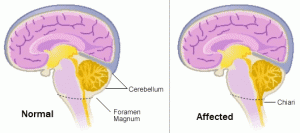by Helen Whitlow, The University of Masschusetts Lowell
Image Credit: http://www.craniofacial.vcu.edu/conditions/chiari.html
Everyone remembers the ALS Ice Bucket Challenge right? That social media craze where millions of people spread awareness of Amyotrophic Lateral Sclerosis (ALS) by uploading challenge videos, including nominations for others to take part. This promoted fundraising to find a cure for ALS, and influenced individuals to actually educate themselves. A lot of people didn’t know what ALS was, until the ice bucket challenge emerged. There are a lot of diseases, illnesses, epidemics, physical, intellectual, and developmental disabilities, where awareness has reached almost every part of the world. Sometimes I wonder if communities know of other illnesses, whether it’s from the news or social media. Have you ever heard of Chiari Malformation?
Chiari Malformation (CM) is a structural defect of the brain and spinal cord, where the cerebellum is in a downward placement at the back of the skull. Normally, the spinal cord should be the only thing passing through. This causes a lot of headaches, neck pains, dizziness, fatigue, and much more major symptoms. In 2009, I was diagnosed with Type 1 Chiari Malformation. For a few years, it was a slight secret, where only my immediate family knew. When I attempted to explain to others that I have CM, I was given the same puzzled response, “you have what now?!” I eventually gave up on informing people. As the reader, I don’t want you to pity, but I want you to understand how you can educate yourself and get involved in public awareness. Unfortunately, there are some fundraising and walks to find a cure for CM, but doesn’t produce the same effect as the ALS Ice Bucket challenge. By educating the reader about how community psychology provides resources on CM, encourages individuals like myself to shine a light on this invisible disease. Taking from the Competencies for Community Psychology Practice, I can address this issue, and hope that social change can arise from my need to advocate.
The eighteen competencies for community psychology help give individuals skills and knowledge on addressing social issues, and aid in the promotion of change. By focusing on the “Community and Social Change” category, the competencies within create more meaning in the education of CM. Collaborating and coalition development with individuals diagnosed with CM, can help educate those in surrounding communities. There are families who are heavily affected, and can use their life experiences to aid community psychologists, in the creation of educational resources. Community psychologists can work with others to improve awareness within the competency of information dissemination and public awareness building. Psychologists can establish more fundraisers and health clinics, providing accessible information to all individuals. They can utilize the ecological perspective competency, and use their work in context, and help individuals affected to increase social change (Scott & Wolfe, 2015, p. 44). Even more so, hoping to reach higher levels of awareness through social media, similar to the ALS Ice Bucket challenge.
My goal of this blogpost is to shed some light on this invisible diagnosis, and encourage readers to research. Well if that did, then I utilized public awareness building! Community psychology can help with creating walks, foundations, and websites, while helping pediatricians and neurologists to become more aware of CM. Chiari Malformation may be invisible, but for individuals like myself, it will always be there. At least until further treatment is needed.
Now that you have learned a bit about Chiari Malformation, and want to learn even more, provided below is a link to the “Conquer Chiari” webpage. Create awareness, and be part of the change. http://www.conquerchiari.org/index.html
#commpsych #chiarimalformation #chiarimalformationawareness #arnoldchiari
Helena Whitlow is a graduate student in Autism Studies Program at the University of Massachusetts Lowell.
References
Scott, V., Wolfe,S. (2015). Community Psychology: Foundations for practice. California: Sage Publications Inc.

